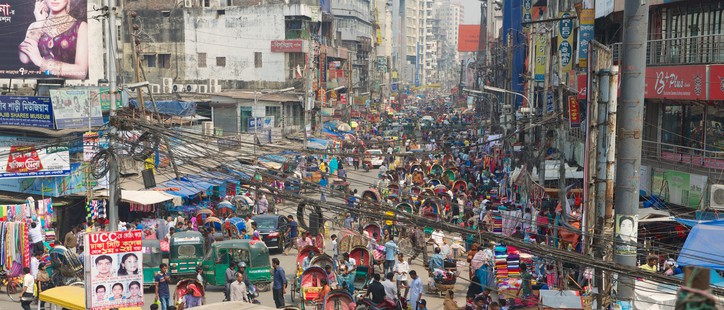Our Opinion: 2017
Bottlenecks in Bangladesh

It’s a huge pleasure to return to this fascinating country and seeing that Bangladesh’s economy is clearly on a roll, although its democracy is weakening.
Bangladesh has changed a lot in 30 years, even if its 160m people remain mostly poor. Its GDP is growing by 7% a year, as fast as China’s and, by some social indicators, has overtaken its giant neighbour, India. With a booming garment industry that now ranks second only to China’s in exports, plus some 10m diligent overseas workers sending money home, Bangladesh has enjoyed current-account surpluses for all but one of the past ten years.
It helps that Bangladesh has global powers competing for influence here. Japan recently gazumped China’s offer to build a new seaport, with a $6.7 billion project that includes a liquefied-natural-gas terminal and four coal-fired power plants. Last July, Russia promised $11.4 billion in loans towards a pair of nuclear reactors. And India, which is already supplying Bangladesh with power from its grid, agreed to finance another big coal-fired power plant to the tune of $1.5 billion. Multilateral institutions such as the Asian Development Bank and World Bank have also upped their aid.
China is working hard to woo the country’s leadership. For the first time in thirty years, a Chinese President visited Dhaka in 1986. Xi Jinping promised $40bn in loans for 21 infrastructure projects including elevated expressways, railroads, bridges and power plants.
Despite impressive recent growth, Bangladesh’s economy still needs all the help it can get. I’ve been reminded today – in Dhaka’s traffic – that this is a country of bottlenecks. Those bottlenecks run through all aspects of the business culture but, in terms of traffic, is made up of an array of tinkling cycle rickshaws, tooting three-wheelers and honking SUVs!
Traffic relief for the capital city’s 17m people—who, the UN predicts, will number 27m by 2030—will not come soon. There are no plans at present for any mass-transit system, and the first of three phases of a cross-city expressway is not due to open until late next year.
By the same token, some 13m Bangladeshi households currently go without electricity. Even with all the added power from aid-funded plants, the country may still face future energy shortages. A recent report from the ADB (the Asian Development Bank) suggests it will need to triple generating capacity by 2030 to meet expected demand, and warns that it must not only build new plants but replace ageing ones.
Yet perhaps the biggest bottlenecks are not physical but political. Sheikh Hasina’s Awami League party has been in power since 2009, and faces a weakened opposition in the run-up to general elections scheduled for 2019. This does not mean it is popular, however. Most of the opposition boycotted the last national polls in 2014, which took place amid widespread violence and resulted in what is virtually a one-party parliament. International attention has focused on a string of gory killings by Islamist radicals, culminating in the attack on a restaurant next to where I am staying in Dhaka, in July, that left 20 (mostly foreign) patrons dead, What worries Bangladeshis more is what many perceive as a broader collapse of the rule of law.
Despite considerable turbulence since breaking from Pakistan following a bloody war in 1971, Bangladesh has a tradition of respect for dissent. This has eroded in recent years as the Awami League, which itself had been a victim of previous purges, has turned on its rivals with a vengeance. “The media are controlled, the judiciary is controlled, and the police are even more enthusiastic than their masters,” according to the secretary-general of the Bangladesh National Party, the largest opposition group, Fakhrul Islam Alamgir.
Aside from extra-judicial killings and disappearances targeting Islamists and other dissidents, the ruling party has instigated an extraordinary barrage of lawsuits, seemingly designed to distract and pre-occupy its opposition. There have been 37,000 court against the Bangladeshi National Party alone. Mr Alamgir recently confirmed “I spend four days a week attending court hearings, and two hours stuck in traffic for every one.”
Perhaps, like previous generations of Asian tigers, Bangladesh will endure a spell of autocracy before its politics become more democratic. But in the meantime, as the head of one Dhaka NGO says with a shake of the head, the country is walking a tightrope: “It is a dangerous thing when people have no vehicle to express their unhappiness.”
30th March 2017
